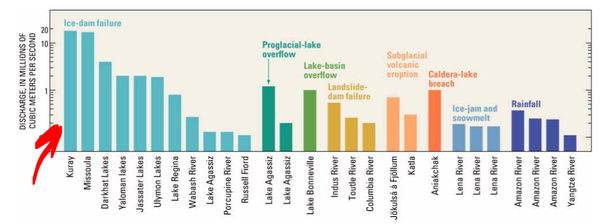Time for Creationists to Reconsider the Noah Narrative
Written on
Chapter 1: The Cost of Creationism
The narrative surrounding Noah's Ark is leading many away from Christianity, with statistics showing a follower lost every 99 seconds. This troubling trend is exacerbated by the promotion of biblical accounts as factual representations of Earth’s history.
“Fire in the hole!” — Image Credit: Dan Piraro/Bizarro comics/“One More Theory”
In my interactions across various online platforms, I often find myself engaged in debates with individuals advocating for a young Earth and other religious claims about our planet's history. Many of these advocates subscribe to the myth of Noah, which ultimately undermines their own faith.
The assertion of a global flood, where only Noah and his family survived aboard a makeshift wooden ark housing pairs—or even sevens—of every animal, is a cornerstone belief for these creationists. They reject the synthesis of modern science, preferring the biblical narrative where, in divine anger, a flood inundated the Earth, submerging its highest peaks under 22 feet of water.
However, such claims contradict well-established, objective evidence.
Section 1.1: The Water Dilemma
Water plays a crucial role in this myth, yet it poses significant issues when we assess the reality. Experts have calculated the total atmospheric water available, estimating around 13,000 km³. If this were to rain simultaneously across the globe, it would equate to merely about 2.5 cm of rain—far from sufficient for a cataclysmic event.
Furthermore, if we assume the impossible—that it could rain continuously for 40 days—calculations reveal that rainfall would need to occur at an astonishing rate of 9 meters per hour. This is simply unfeasible, as rain relies on a cyclical process of condensation and precipitation.
Historical records show that significant rainfalls have occurred, such as in Eglwyswrw, Wales, where it rained for 82 consecutive days without leading to a global deluge.
To illustrate the enormity of the water claim, the biblical flood would require 813,875,076 miles³ of rain—over two and a half times the total volume of all water on Earth.

Section 1.2: The Animal Conundrum
Now, consider the logistics of housing animals. With 8.7 million species identified, Noah would have had to gather approximately 17.4 million animals—an impossible feat for just eight individuals.
To suggest that Noah and his family could manage the care and feeding of millions of animals is ludicrous. Modern veterinarians in zoos, equipped with extensive knowledge and resources, often struggle to maintain animal health, let alone a family with no prior experience in animal husbandry.
Assuming an impractical scenario where they took a week to collect each species, the timeline would extend to 83,424 years per person.
Even if we were to consider the space available on the ark, the needs of the animals—along with the waste generated—would create an uninhabitable environment.
Chapter 2: Geological Evidence Against the Flood Narrative
The first video, "Believing Noah's Flood Actually Happened Is NOT Irrational," offers insights into the arguments surrounding the validity of the Noah narrative.
Adding to the argument, geological findings such as desert deposits and coral reefs provide further evidence that contradicts the biblical account of a universal flood.
Moreover, the logistics of constructing a seaworthy vessel capable of withstanding such conditions are highly questionable. The largest wooden ship ever built required a crew of 14 to sail, while the biblical account attributes this task to eight amateurs.
The continual adherence to the Noah myth, despite overwhelming evidence to the contrary, is not just an intellectual exercise; it is actively driving people away from faith. In the United States, 3,500 individuals renounce Christianity each day, with many citing anti-science stances as their reason for leaving.
The second video, "Origins Debate: Creationism or Theistic Evolution?" explores the ongoing discussions between differing beliefs.
In conclusion, for Christianity to retain its followers, it must confront these outdated creationist beliefs. The choice between faith and reality should not be a contentious issue; rather, it is essential for the future of the religion that it embraces scientific understanding rather than clinging to myths that only serve to alienate the next generation.